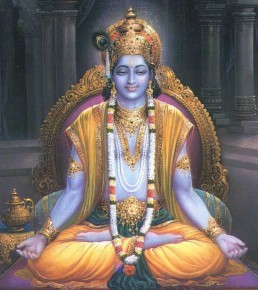Swami Chinmayananda
Swami Chinmayananda Commentary
Here we have a description of a Tamasic “doer” pursuing his work motivated by his Tamasic “knowledge” and expressing himself through his Tamasic “actions.”
UNCONTROLLED (Ayuktah) — A “doer” who has no control over himself, and therefore, is ever unsteady in his application, is of the Tamasic type. He becomes unbalanced in his activities, because his mind does not obey the warnings of his intellect. A yukta-mind is one which is obedient to and perfectly under the control of the intellect. A tamasic man is uncultured inasmuch as he acts in the world, spurred by the impulses and instincts of his own mind. The glory of a cultured man comes out only when he brings the impulsive storms of his mind under the chastening control and intelligent guidance of his intellect. He is Ayuktah who behaves with no control over his own animal impulses and low instincts. When such an individual acts in the world, he cannot but behave as a vulgar man (Praakrita).
If shown an intellectual mirror, he will never admit the reflected vulgarities as his own, nor will he acknowledge his way of living as base and licentious. He is arrogant and obstinate (Stabdhah) and in his stubborn nature he will not lend himself to be persuaded to act more honourably.
DISHONEST (Shathah) — He becomes dishonest. He becomes extremely deceitful. Herein the dishonesty, or deceitfulness, arises out of his incapacity to see any point-of-view other than the false conclusions he has arrived at. Such an individual is not a dependable character, for he conceals his real motives and purposes and secretly works out his programmes which generally bring about a lot of sorrow to all around him.
MALICIOUS (Naishkritikah) — The term describes, according to Shankara, one who is bent upon creating quarrels and disputes among people. With a vengefulness, such a person pursues his adversary to destroy him.
INDOLENT (Alasah) — The “dull doer” is a very indolent man spending his time in over-indulgence. He is an idler, for he avoids all creative endeavours and productive efforts, if by deceit or cunning, he can easily and readily procure enjoyable chances and pleasure-goods. He pursues such a path, however immoral it may be. He is a social parasite; he enjoys and consumes without striving and producing. He puts forth no effort; drowsiness of intellect that renders him incapable of correct thinking is a typical feature. The three brothers, from Lanka, in fact, represent these three types of “doers.” Of them, Kumbhakarna, who sleeps six months and wakes up only to spend the rest of the six months in eating, is symbolic of a Tamasic “doer.”
DESPONDENT (Vishaadi) — He is one who will not meet the challenge of life squarely. He has neither the vitality nor the stamina to stand up against the challenges of life. This is because his over-indulgent nature has sapped up all his vitality and courage to meet life. Invariably, he spends his time complaining of men and things around him and wishes for a secure spot in the world, where he can be away from all obstacles so that he may peacefully continue satisfying his endless thirst for sensuous enjoyments.
PROCRASTINATER (Deergha-sootree) — An individual so benumbed in his inner nature, slowly gathers within himself an incapacity to arrive at any firm judgement. Even if he comes to any vague decision, he has not the will to continue the consistent pursuit of his judgement. Indolent as he is by nature, more often than not, he postpones the right until it is too late. This procrastinating tendency is natural to a Tamasic “actor.” The term deergha-sootree has been interpreted by some commentators as “harbouring deep and long (deergha) vengeance against others (sootra),” which is also not inappropriate in the context of the thought development in this stanza.
Thus, one who is unsteady, vulgar, arrogant, deceitful, malicious, indolent, despondent and procrastinating, belongs to the ‘dullest’ type of “agents” available in the fields of human endeavour. This and the two preceding stanzas provide us with three beautifully framed mental pictures, bringing out in all details the Sattwic, the Rajasic and the Tamasic types of “doers” available in the world. As we have already emphasised these pictures are NOT yardsticks to classify OTHERS, but are meant for the seekers to observe themselves. Whenever a true seeker discovers symptoms of Tamas and Rajas growing in him he should take notice of them at once and consciously strive to regain his Sattwic beauty.
ACCORDING TO THE PREDOMINATING GUNA, “UNDERSTANDING” AND “FORTITUDE” ALSO CAN FALL UNDER A THREE-FOLD CLASSIFICATION — SAYS KRISHNA:
Adi Sankara Commentary
The agent who is ayuktah, unsteady; prakrtah, naive, of very unrefined intelligence, like a child; stabdhah, unbending like a staff-he does not bend down to anyone; sathah, deceitful, cunning, hiding his own powers; naiskrtikah, wicked, given to destroying the livelihood of others; alasah, lazy, not inclined even to his own duties; visadi, morose, ever in a mood of dejection; and dirghasutri, procrastinating, postponing duties for long, [Ast. adds here, ‘sarvada mandasvabhavah, always slow by nature’.-Tr.] not accomplishing even in a month what is to be done today or tomorrow;-one who is such, he ucyate, is said to be; tamasah, possessed of tamas.
The Bhagavad Gita with the commentary of Sri Sankaracharya – Translated by Alladi Mahadeva Sastry
Holy Geeta – Commentary by Swami Chinmayananda
The Bhagavad Gita by Eknath Easwaran – Best selling translation of the Bhagavad Gita
The Bhagavad Gita – Translation and Commentary by Swami Sivananda
Bhagavad Gita – Translation and Commentary by Bhaktivedanta Swami Prabupadha
Srimad Bhagavad Gita Chapter 18 – Verse 28 – 18.28 ayuktah prakrtah – All Bhagavad Gita (Geeta) Verses in Sanskrit, English, Transliteration, Word Meaning, Translation, Audio, Shankara Bhashya, Adi Sankaracharya Commentary and Links to Videos by Swami Chinmayananda and others – 18-28

